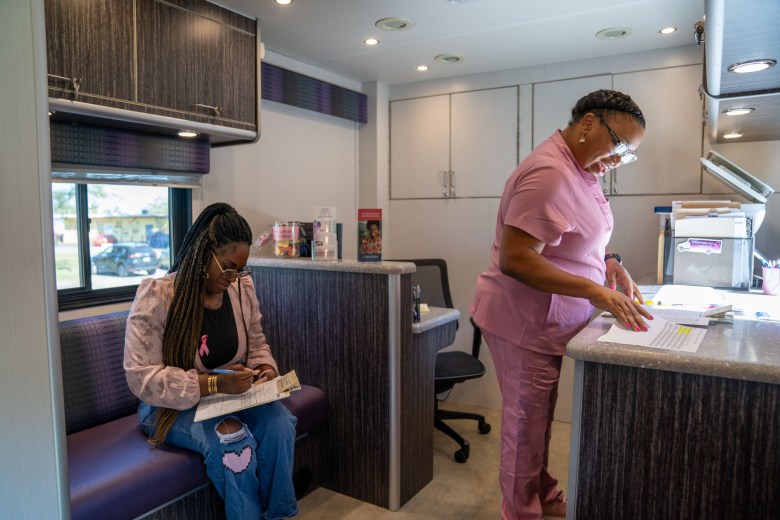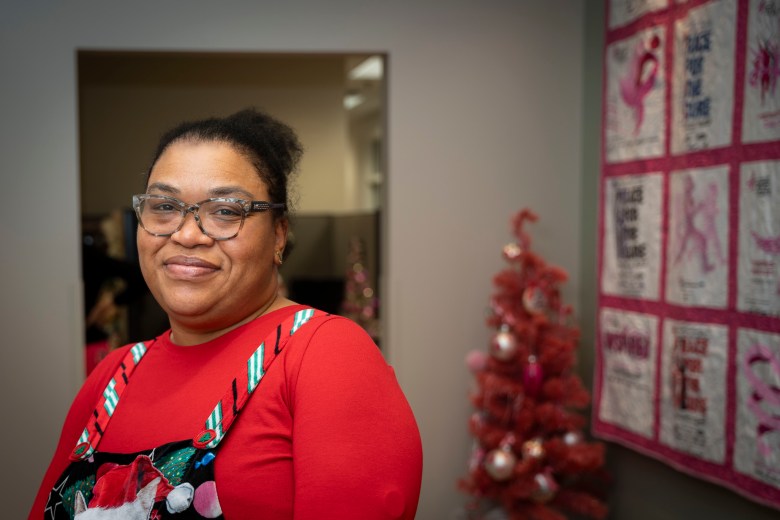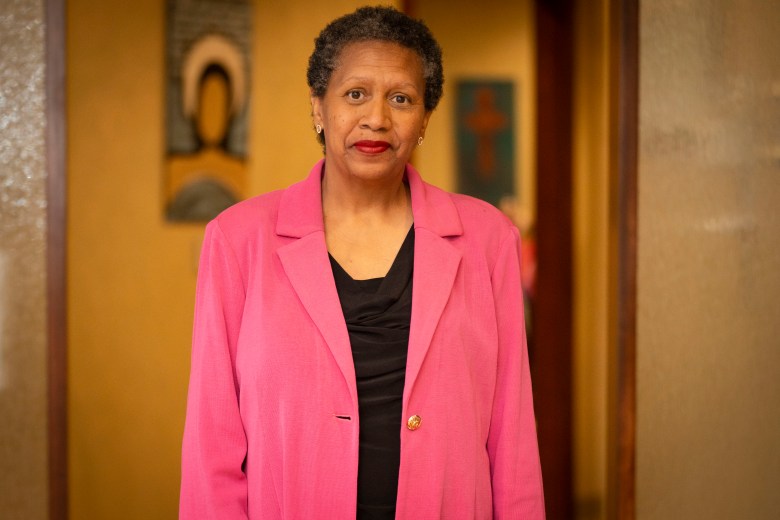
The last time Marian Fryer’s friend told her she wanted yet another doctor to confirm, for sure, she had breast cancer, Fryer gave an urgent warning: You’re wasting critical time.
“She didn’t trust that she had cancer. She kept going to get a second opinion and a second opinion,” said Fryer, 61, a Black Memphis school teacher whose breast cancer is in remission.
Her friend eventually accepted her diagnosis. “But, by that time, the cancer had grown,” said Fryer, who has continued to support her frightened friend’s journey toward a hoped-for healing.
Get more stories like this in your inbox every Wednesday in The Weekly.
Subscribe to MLK50’s newsletter
and get Memphis-rooted news and insights
right-sized for your neighborhood.
A year ago, Fryer rang the “bell of success” at Baptist Cancer Center, where she went on to volunteer. Doctors marveled at how her cancer went into remission just six months after her first surgery. Fryer attributes her recovery to several factors. Chief among them was her quick decision to have cancerous tissue removed in July 2023 and follow that with chemotherapy. Also playing a role, Fryer said, was the healthy eating and fitness regimen that already existed but got ramped up, her medical team’s compassionate care and her Christian beliefs and practice.
Yet for other Black women, distrust of medical systems, age-old stigma about cancer and miseducation about the disease are among the factors resulting in them, disproportionately and increasingly, being diagnosed with breast cancer in its later, least treatable and most deadly stages. But self-styled and strategic campaigns look to make inroads against those misgivings and attitudes. Black women who’ve survived breast cancer are talking — where they live, play, work and worship — about the urgent need for self-exams and routine mammograms. Into neighborhoods, they are steering mobile mammogram units where mammography technicians screen privately insured women and low-income patients whose costs are covered by TennCare.
Boosting those grassroots efforts is ongoing research on why Black Memphian women, like Black women nationally, have been twice as likely to die of breast cancer than white women. The newest analysis is slated to explore what motivates some to immediately submit to cancer treatment while others do not, sometimes they don’t know how to access it. Scheduled to start in January 2025, the University of Tennessee Health Science Center qualitative study will gather women’s and transgender men’s subjective assessments of their health and health care, gauging everything from attitudes about breast cancer prevention and early detection to barriers to diagnosis and treatment to the disease’s long-term impacts on survivors’ lives and lifestyles.
Also slated to evaluate the role and perspectives of oncologists from western Tennessee, northern Mississippi and eastern Arkansas, the regional study could have nationwide implications and applications, said Dr. Gregory Vidal, an oncologist and internist who directs clinical research at West Cancer Center & Research Institute and Janeane Anderson, a professor in UTHSC College of Nursing’s department of community and population health. Anderson and Vidal, also a UTHSC oncology professor, are leading the three-year, $1.58-million study.
“We see a lot of women who have breast cancer not going to get their care early, [often] just because they’re uninsured and don’t know where to go,” said Vidal, whose prior research includes analyzing what persuades Black Memphian women to enroll in clinical trials of breast cancer treatments. “That’s sort of common among Black women here.”
Death rates decline, but less so for Black women
Black peoples’ comparative reluctance to participate in trials, which might yield medicine better tailored to optimally meet Black health needs, stems from beliefs that “medical research is designed to harm minorities,” and “God determines wellness, not research,” according to a 2023-24 University of Maryland School of Medicine study of 100 cancer patients.
Other factors also hinder cancer diagnoses and care, Anderson said. “There is a disproportionate burden of structural barriers: Insurance access, environmental injustice. Are you living too close to a highway?” she added, noting how exposure to vehicular exhausts raises cancer risks. “Does your neighborhood lack green space? Classism plays a role in Black women’s health in a place like Memphis.”

Those realities and the data underlying them are part of why, in March 2024, cancer survivor Queen Cunningham traded her job as an EMT to drive a mobile mammography van for Baptist Memorial Health Care.
On a brisk, sunshiny November day, Cunningham, 43, bounded out of that van to swoop up a 50-something Black woman, toothless and teary-eyed, standing at the bottom of four steps leading to the van’s entrance. Inadvertently, a TennCare driver who gave the woman a free ride from her side of Memphis to a stretch of corporate offices near Germantown had dropped her at a multi-story office building across a parking lot from Cunningham’s van; a building employee directed that frazzled mammography patient to the mobile unit.
“Come on in here. Everything’s gone be alright,” Cunningham said, trying to soothe.
Cunningham ushered the woman up the steps and gave her a few minutes to settle her nerves before logging her name and other coordinates into a computer’s catalog of electronic records. In a second room, the woman would partially undress and then follow the mammography technician’s instructions.
Of course, she appreciates the paycheck she earns from driving a screening van and doing other outreach, Cunningham said. But more than being money-minded, she’s on a mission to help change health trends. Black women were 40% more likely than white women to die from all forms of breast cancer, according to a Mass Brigham General study published in September 2024. Roughly 34,000 of the more than 228,000 breast cancer cases in that analysis involved Black women.
Black women who didn’t have regular mammograms were three times more likely than white women to be diagnosed with stage 3 or stage 4 breast cancer instead of more treatable stage 1, according to preliminary findings of a Breast Cancer Research Foundation study, enrolling 5,000 women, released in December 2024. The full report will be published in 2025.
Those data aside, cancer mortality rates have continued a years-long decline, though at a lesser pace for Black women than white ones. Cunningham is a prime example of how the disease no longer is an automatic death sentence. Yet, her ongoing health journey hasn’t been easy. Her cancer went into remission in October 2019, but it took her five years of bettering her self-care and following her doctor’s prescriptives to really feel good again, with enough energy to get through the day. That’s partly because diabetes and high blood pressure had taken a toll on her body even before cancer hit her.
When Cunningham shares those details, she’s offering herself as an illustration of what works for and against a patient. “I developed better eating habits, and I try to stay on top of that. I see my therapist monthly to deal with the anger and stress of being sick. You can’t talk yourself up when you feel bad just by saying, ‘I’m healed’ … This can be more mental than anything else at times.”

Above all, she implores Black women, in particular, not to be afraid to face facts. “Some people are scared to death to know what’s going on with them,” Cunningham said.
After being screened by the technician teamed with Cunningham, first-time mammography patient Tracy Horton, 45, was told she needed a second look. An in-hospital exam revealed that tissue in one breast was denser than in the other.
The clinicians, it turns out, didn’t find a malignancy. Horton got a clean bill of health. The procedure, nonetheless, changed her. “It took my awareness to another level,” said Horton, a certified nursing assistant. “You need to get tested, whether you’re afraid or not. I’m excited to be able to tell other women that.”
Aiming for fewer mammography no-shows
Black women accounted for seven of the nine low-income TennCare patients who signed up for that November day’s free mobile-unit screening. Also screened were one white and one Latina not fluent in English. Leaving the mobile, Cunningham escorted that latter woman back to her husband, who waited for his wife in the parking lot, so she could explain to him how to use a $100 gift card given to each TennCare patient who showed up. Two of the nine women did not keep their appointments; Baptist Memorial Health would not confirm their race, contending that such disclosures violate patient privacy protections.
Seven women with private insurance and jobs in the adjacent office building were screened, too, that day.
In October, a scheduled day of screenings at the Gaston Park branch of Memphis Public Libraries — Black people comprise 96% of residents in the library’s immediate catchment area — was canceled after no one signed up.
“The librarian worked very hard to fill spots — to no avail,” Molly Ebach, a Baptist Memorial Health Care spokeswoman, wrote in an email.
Wellpoint, one of the private health insurers administering Medicaid in Tennessee, gave those $100 gift cards to TennCare patients who showed up on the mobile van. “Most of our members are hard to reach,” said Elisha Channel, a Wellpoint case consultant accompanying Cunningham. By that, Channel meant it’s hard to persuade many TennCare patients to be screened.
Understanding what drives such hesitation, if not outright reluctance, and other aspects of breast cancer in Black people is critical to treatment and what, in the long run, it might yield, the UTHSC researchers said.
For example, oncologist-researcher Vidal said some new patients reflexively reject the very idea of undergoing cancer-fighting chemotherapy. “‘Tell me why you’re saying ‘no’ to chemo,’” he said, repeating his counterpoint to patients who presume chemo is brutal on bodies, as they’d heard.
“‘What they have now is very different from what you know about,’” he continued, recalling. “‘And there are additional, supporting meds that can help manage the adverse side effects. The goal is to cure cancer, not leave you disabled.’”
Another goal of the coming UTHSC research, enrolling 150 people, is exploring what happens in the midst of cancer treatment or after patients seemingly have fully recovered. Domestic violence suffered by some whose cancer has gone into remission is a glaring, overlooked issue, Anderson said. Some survivors end up with vaginal dryness so severe that sexual intercourse is too painful to endure, which infuriates some romantic partners.
“A partner thinks you’re out of the woods,” said Anderson, who previously researched the sexual health of breast cancer patients. “Many partners don’t understand the physical limitations … This can be an uncomfortable conversation for doctors and patients.”
But it should be a normal, routine part of ongoing follow-up care, she added.
The new research, funded by California-based biopharmaceutical company Gilead Sciences, will consider how well oncological care reaches people where they work and live, not just in clinical settings. Community-based efforts – whether neighbor-to-neighbor chats about cancer that remove stigma or mobile vans offering mammograms – are indispensable, parallel endeavors, health workers, researchers and activists say.

“After I came out with my story, so many people around me started getting tested,” Fryer said. “It turned out that five people in my [school] building, including me, had cancer at the same time; two gentlemen with prostate cancer and three women,” including two with breast cancer and one with colon cancer.
And Cunningham, the van driver: “I love my job because I get a chance to come into the community and meet people where they are. I just talk to them. I tell them, ‘You’ve got to get screened to take care of yourself. You’ve got to believe.’”
Katti Gray’s news coverage has appeared on ABC.com, CBS.com, and in The Guardian US, The Los Angeles Times, Newsday, Reuters, The Washington Post and other publications.
This is homegrown journalism, and it’s powered by you.
Stories like this are possible because of readers like you. When you donate today, your gift will be tripled, up to $1,000 per gift, thanks to generous matching support from the John D. and Catherine T. MacArthur Foundation and the Diversity, Equity & Inclusion Partner Fund. Help us unlock $5,000 in matching funds and sustain impactful, homegrown journalism rooted in Memphis.

Donate today to maximize your impact and help us hold power to account.
This story is brought to you by MLK50: Justice Through Journalism, a nonprofit newsroom focused on poverty, power and policy in Memphis. Support independent journalism by making a tax-deductible donation today. MLK50 is also supported by these generous donors.


